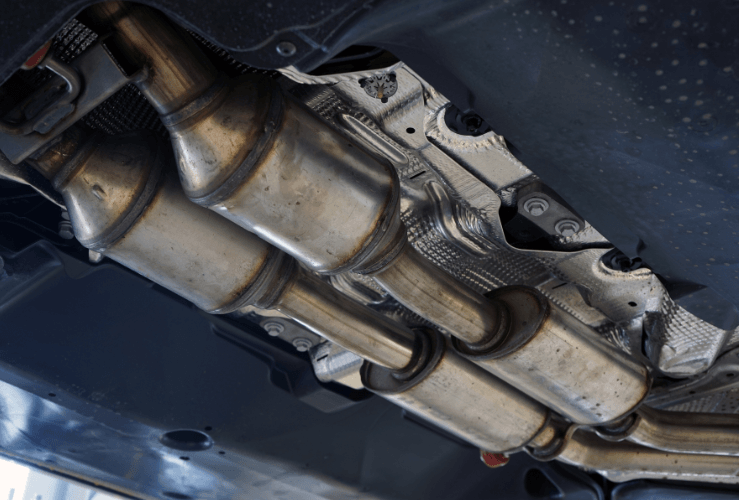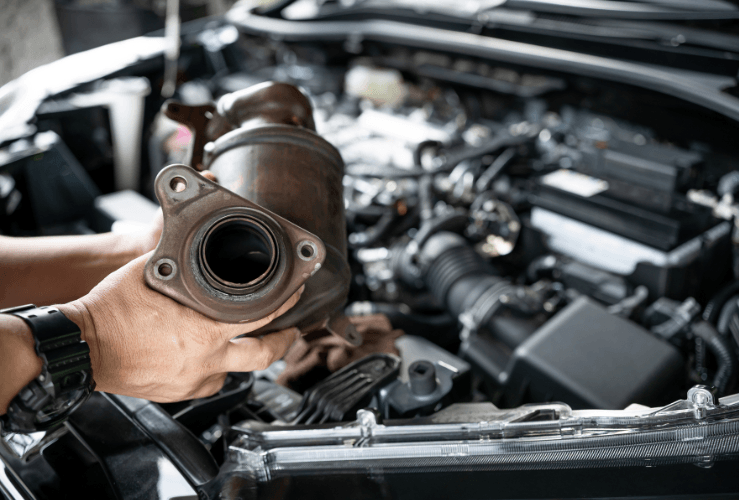A failing catalytic converter can cause several issues, including engine failure. If you notice any of the following symptoms, yours could be clogged and may need replacing.
Catalytic converters were developed in the 1970s as a way of capturing harmful pollutants from vehicle exhaust systems.
They have been a mandatory feature of all UK-manufactured cars since 1993, underpinned by law.
Most estimates suggest catalytic converters transform more than 90% of hydrocarbons (HC), carbon monoxide (CO) and nitrogen oxides (NOx) into carbon dioxide (CO2), nitrogen and water vapour - which are significantly less harmful to humans and the environment.
These devices contain ceramic honeycomb structures made of precious metals that enable the catalysing process.

Warning signs: What happens when your catalytic converter gets clogged?
A clogged catalytic converter may result in one or more of the following symptoms:
- Rotten egg smell (sulphur from the exhaust)
- Extreme heat from underneath the car
- Reduced engine performance
- Decreased fuel efficiency
- Difficulty starting the engine
Causes of a clogged catalytic converter
A clogged catalytic converter may be the result of:
Carbon deposits
Soot and carbon deposits from the engine combustion process build up over time. This is normal and unavoidable.
Physical damage
Driving over speed bumps and striking other objects can lead to a cracked catalytic converter, which may reduce its effectiveness or stop it working altogether.
Rich fuel mixture and misfires
Too much fuel in the air-fuel ratio can lead to unburned fuel reaching the converter, which clogs it up more quickly than it otherwise would.
What happens if my catalytic converter is missing/stolen?
Catalytic converters are targeted by thieves because they contain precious metals such as palladium, platinum, and rhodium. The criminals then sell the devices online, at scrap yards, or overseas.
Symptoms of a missing/stolen catalytic converter:
- Loud exhaust sound while idling
- Loud noises while accelerating
- Reduced engine performance
- Smell of exhaust fumes
- Increased emissions
- Warning lights appear on the dashboard
- Trouble starting the engine
- Damage to the underside of your vehicle (caused by the tools used to remove the device) - although at this point, the absence of the device may be obvious!
Find out ways how to prevent catalytic converter theft.

What happens if you don’t get your bad catalytic converter replaced?
If you continue to drive with a clogged catalytic converter, you run the risk of serious engine failure. If you notice any of the above symptoms, get your car checked over by a mechanic. It could save you money and stress later on.
How long will my catalytic converter last?
Catalytic converters are designed to last around 10 years. However, you only need to think about replacement when you notice the symptoms of failure.
How much does it cost to replace a catalytic converter?
The cost of a new catalytic converter will vary depending on the make and model of your car. Costs range from £150 to £900. But for some higher-end models, the cost might exceed £1000.
It takes 1-2 hours of labour to install a new catalytic converter. This cost will be added to the final bill.
Auto repair: Is it cheaper to go to an independent garage?
Yes, it is likely to be cheaper to get your catalytic converter replaced by an independent auto repair garage compared to a franchise dealer—by about £100.
Car maintenance and your catalytic converter
Regular inspections of your catalytic converter will help identify any issues before they develop into more serious - and potentially costly - problems.




